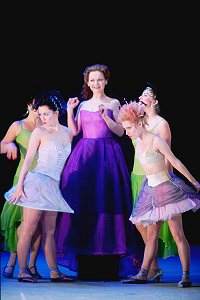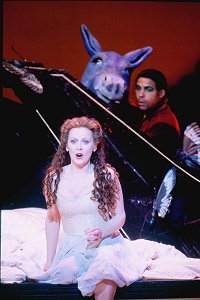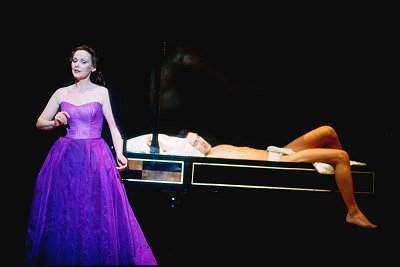S & H Opera Review
Purcell, ‘The Fairy Queen’ English National Opera, June 12th 2002. (ME)
O Showes! Showes! Mighty Showes!
The Eloquence of Masques! What need of prose? Ben Jonson
What indeed, and what need of anyone other than ENO to bring us this absolute explosion of joy; this was a complete company show, offering to those of us fortunate to call ourselves regulars, such delights as seeing the baritone we last heard in a sober Verdi role cavorting in sprightly mein bedecked in faery spangles. The ‘American Tourist’ overheard at either ‘Hamlet’ or ‘Tosca’ (take your pick) opining ‘It’s more of a PLAY / OPERA than a SHOW, isn’t it?’ would not be so disappointed here, for this ‘Entertainment in Three Parts and Nine Masques’ could not possibly fail to please even those unaccustomed to opera, and for those whose artistic palates are jaded by dull singing and aimless direction, it offers the rare joy of truly accomplished performance and a production that delights the senses.
I saw it first time around in 1995, and I am certain that this revival has resulted in an even more delectably camp approach, with the Fairies presented even more obviously as denizens of a dangerously exotic other – world and the sense of androgyny pervading over all – delicious. Dunya Ramicova’s costumes, now daringly exiguous, now superbly baroque, led the way in suggesting these entrancing, magical worlds of the imagination, and they formed part of a complete artistic endeavour within which every singer and dancer displayed the most total commitment.
Tom Randle has made the part of Oberon his own, and whilst his voice is not the most absolutely beautiful Purcellian sound, it would be difficult to find another tenor who could fulfil all the role’s requirements with such style, quite apart from looking so good in those tight leather trousers. He sang ‘Thus the gloomy World’ with real fire, and his acting and movement are at the level of straight theatre. His Fairy Queen was Joan Rodgers, who sang her ‘Plaint’ very beautifully indeed, although earlier in the evening I found her diction rather cloudy. She looks fabulous in her costumes and makes absolute sense of all she has to do, even when it has the potential for embarrassment.
As always with ENO, the principals were not merely brightly lit personages behind whom all else was in shadow, since there was some world class singing on stage from many individuals, notably Carolyn Sampson, Christopher Josey, Mary Nelson, Ryland Angel and Jonathan Best. Carolyn Sampson was first heard here as Amor in ‘Poppea’ and she is well known as a concert singer; her performance in the ‘Birthday’ scene was treasurable in every way, and she delivered her music with real taste and feeling. The counter – tenors Christopher Josey and Ryland Angel contributed an absolutely hilarious ‘Let the Fife and the Clarions’ as ‘The Duettes,’ and Josey also sang elegantly as the initially reluctant Dick, the amour of Jonathan Best’s endearingly besotted Drunken Poet, who sang ‘Hush, no more’ most beautifully. Mary Nelson and Gail Pearson gave their all as Phoebus and Spring, and mention must be made of Mark le Brocq’s delectable impersonation of Autumn as a blowsy ‘WI Fete lady’ in contrast to his wonderfully camp Boggart.
So many talents were on show here, in dancing as much as singing, and those who saw the production first time around will have been delighted to experience once more the exquisitely languid Indian Boy of Arthur Pita; Nikolas Kafetzakis was an athletic, mellifluous, totally engrossing Puck, and Martha Wildman an exciting, challenging Assipattle. In the pit, Paul Daniel directed with real sensitivity and assurance; what a difference to his recent ‘Valkyrie,’ where he seemed ill at ease and under – prepared; Purcell’s music may appear all elegant lightness and grace, but Daniel rightly understood that it is made of much more than that, and the shaping of such pieces as Titania’s lament, so closely resembling ‘When I Am Laid in Earth,’ and the wonderful ‘Now the Night is chased away’ served to remind us of the composer’s greatness. The pared – down orchestra was perfectly suited to provide what must surely have been Purcell’s desired texture, that of an adapted string quartet, and the playing was a delight from beginning to end.
‘Hark! hark, the echo’ing air a triumph sings…’ - it certainly does, and with this ‘Fairy Queen’ the ENO has a major one on its hands. Unmissable.
Melanie Eskenazi.
Titania and Fairies
Titania and Oberon
Titania and Indian Boy



 Return to:
Return to: